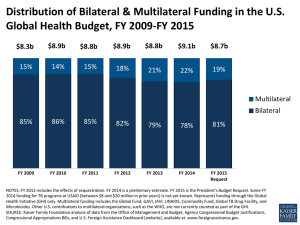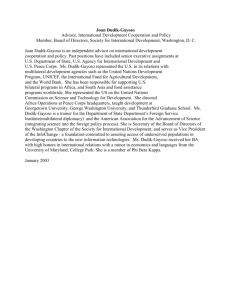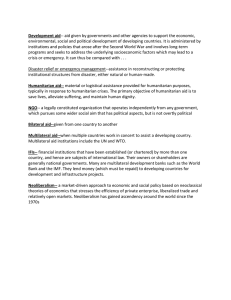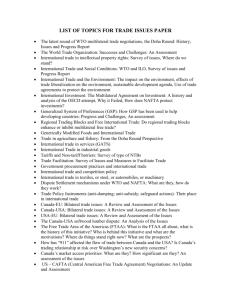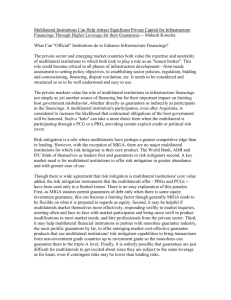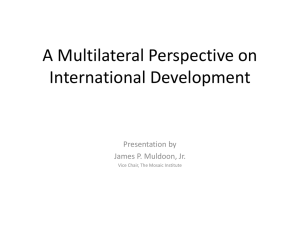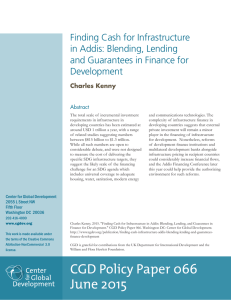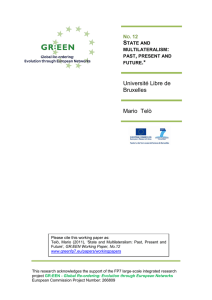Newfarmer Changing Global Governance Nov 24
advertisement
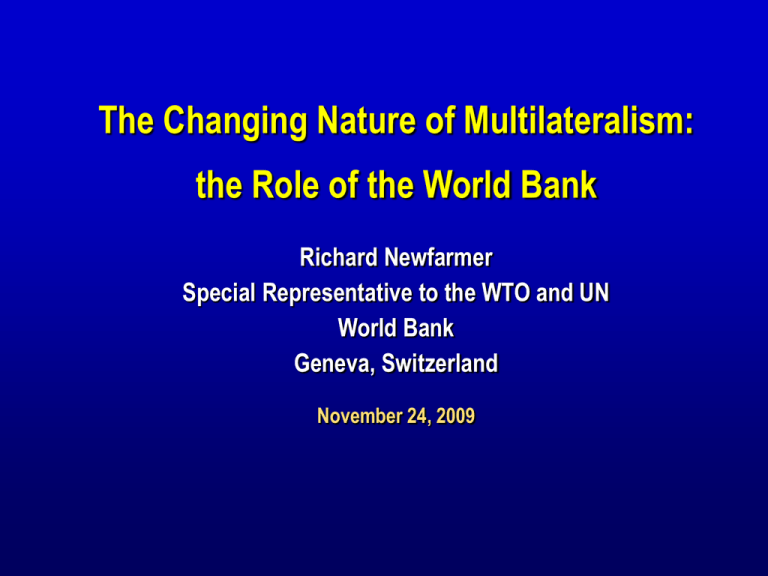
The Changing Nature of Multilateralism: the Role of the World Bank Richard Newfarmer Special Representative to the WTO and UN World Bank Geneva, Switzerland November 24, 2009 Multilateral system is changing rapidly… Inexorable long term trends are increasing the economic power of developing countries… …and the challenges of globalization require collective multilateral response… and the problems of today’s world cannot be solved without their participation One example: the financial crisis can only be met with a multilateral response The World Bank is responding… and changing in the process Globalization and growth are increasing the role of developing countries, especially the BRIICS… Exports from developing and developed countries, 1980-2030 US$ billion 25 $23 trln 20 23% 15 18% 22% BRIICs Other Developing countries 21% 10 13% 20% 5 5% 19% 76% 0 1980 Source: World Bank simulations with Linkage model. High-income countries 67% 61% 55% 2005 2015 2030 China, India, and other developing countries will become centers of global demand over the next quarter century GDP at PPP exchange rates US$ trillion 45 40 35 30 Other developing countries China 25 20 USA 15 EU 10 India Russia 5 0 2001 2005 Source: World Bank simulations with Linkage model. 2010 2015 2020 2025 Brazil Indonesia South Africa 2030 …and the share of developing countries in global output will rise… US$ trln 160 ---GDP at Market Prices---- -----GDP in PPP------ 140 120 100 48% $66 tn. 80 60 10% 13% 40 22% 18% 20 BRICs 23% Other Developing countries 27% 20% High-income countries 52% 30% 2005 2030 0 2005 2030 Source: World Bank simulations with Linkage model. A key driver is rapid diffusion of technology and knowledge… Millions of internet users 700 600 500 400 High income 300 BRIICS 200 100 Other Low & middle income 0 1 9 19 3 9 19 5 9 19 Source: World Bank, Global Economic Prospects (2008) 7 9 19 9 9 19 1 0 20 3 0 20 5 0 20 Globalization will portend huge stresses as economies integrate into the world economy… Distribution of benefits will be uneven…hence need for development assistance Increased trade and financial flows increases policy spillovers with potential beggar thy neighbor effects – hence the need for new disciplines and Because of global integration makes countries learning about policies that work (policy convergence) inter-dependent, global problems require Environmental pressures will become severe hence needs for concerted multilateral solutions… with –increasing multilateral action to protect the global commons participation of developing countries Migration and cross-border movement of people spread infectious diseases – hence need for coordinated health response Disruptions in some globalized markets could become more common -labor markets, food and energy, and financial – hence needs for collective responses One example: Responding to the financial crisis and Great Recession Successive waves of financial deregulation in the US One example: Responding to the financial crisis and Great Recession Successive waves of financial deregulation in the US Expansion of opaque financial innovation Subprime mortgages Home equity lending Consolidated Debt Obligations Credit Default Swaps Emergence of unregulated borrowing in the shadow banking system Mortgage companies Investment banks Hedge funds …leading to excessive leverage of consumers, corporates, and public sectors Excessively easy money after 2001 Fiscal stimulus as US budget swung from surplus to large deficit …financed by China and other countries accumulating large reserves The bubble bursts… financial panic… and the Great Recession MSCI equity price indexes, January 2005=100 Emerging markets So… 30% of household wealth wiped out $4 trillion of equity worldwide Euro Area Pension funds obliterated Unprecidented contraction in consumption USA Sept-2008 Source: World Bank, Global Economic Prospects, 2009 The crisis required a multilateral response… and the G20 leaders strive to coordinate actions… G20 Summits Nov. 15 April 2 Sept 23 Fighting this Crisis • Global fiscal stimulus • Coordinated monetary policy • Restraining protectionism • Enhanced IMF resources Preventing the Next One • Managing systemic risk • Oversight of credit rating agencies • Enhanced disclosure/common accounting Reflecting New Realities/Enhancing Legitimacy • G-20 supersedes G-8…? • Developing countries in Global Stability Forum • Reforms of the IMF and WB Liquidity in global inter-bank markets have virtually returned to normal conditions LIBOR-OIS spread, key policy and regulatory responses Oct G-7 meeting Precrisis USD average Source: World Bank, DEC Prospects Group dollar euro Equity markets have recouped between a third and a half of their losses… MSCI indices of EM Asia, EM Europe, Latin America and Mature Markets (Jan 1, 2007=100) Source: World Bank, DEC Prospects Group Trade, devastated in early phases, is a leading sector out Export volumes, seasonally adjusted, annual percentage change (rolling quarterly average over previous quarter) Source: World Bank Industrial production has turned around Industrial production, percentage change (3m/3m, saar) Developing OECD Source: World Bank, DEC Prospects Group. World Recovery is beginning… with developing countries leading % change GDP annual growth rates (%) Forecast 7 Developing countries JPM: 5.8 4.4 5 JPM: 2.7 3 1.6 High-income countries 1 -1 -3 2000 2001 2002 2003 2004 2005 2006 2007 ? 2008 2009 2010 But damage is severe – and it may take years to regain lost output (Reinhart-Rogoff, 2009; Cecchetti, et al 2009) Source: World Bank, Global Economic Prospects, 2009, GEP Update, 2009, and JP Morgan Repairing the damage: Policy issues Providing adequate support to unemployed workers – and to the poor will be crucial ILO: 40-60 million more workers will be unemployed in 2009 than in 2007 Employment usually takes twice as long to recover as output (Reinhart and Rogoff, 2002) (Claessens, et al, 2008) Maintaining open markets during periods of high unemployment will be critical to sustaining trade-led growth Reallocating global balances and managing exchange rate realignment requires continued (and better) G20 coordination Financing widening fiscal deficits – necessary to maintain health and social spending -- could prove difficult problematic Financing fiscal stimulus programs will pose serious challenges -- as will unwinding deficits in out-years Source: Consensus Forecast, October 2009 Note: The data represent the key budget balance, which differs across countries. For example, for Argentina, the balance refers to the consolidated non-financial public sector budget; for Brazil, it refers to the nominal public sector borrowing requirements while for Chile, it represents the general government budget balance. …global borrowing from private markets is still expensive… and may remain so for some time Emerging-market bond spreads Before Lehman Brother Source: World Bank What is the role of the World Bank in the crisis- and in the multilateral system of governance? In the beginning… • born after World War II as the International Bank for Reconstruction and Development • to help countries reconstruct after the war -- focus on infrastructure and industry • part of the extended UN family, but separate governance structure • owned by 185 countries with votes according to paid in capital • US largest shareholder (16%) • Japan • 25 now second largest (15%) Executive Directors The World Bank’s role… Provide financial resources for investment directly through loans indirectly – guarantees and insurance Provide knowledge about what works in poverty reduction and what doesn’t through policy advice technical assistance bringing people together Provide “public goods” Data and comparative indicators of policy (trade, finance, doing business, debt) Research into what works and what doesn’t Advocacy of global policies that affect poor Global environmental work and infectious diseases The World Bank Group comprises five organizations with differing instruments… THE WORLD BANK GROUP International Bank for Reconstruction and Development (IBRD) • Supports middleincome countries • Provides loans at AAA terms plus cost spread • Funded through bonds, backed by shareholder capital International Development Association (IDA) • Supports the world’s poorest countries • Provides softloans and grants plus debt relief • Replenished every 3 years by donors and through IBRD income International Finance Corporation (IFC) Multilateral Investment Guarantee Agency • Supports the private sector in developing countries • Supports investors in developing countries • Provides loans and equity investments • Provides political risk insurance • Backed by shareholder capital • Funded through bonds, backed by shareholder capital International Center for the Settlement of Investment Disputes • Offers mediation and arbitration services for investors in developing countries The World Bank is deploying various instruments to respond to the crisis IBRD: commitments of $100 billion over the next three years IDA: Front load commitments from US$42 billion IFC: about $30 billion over the next three years Expanded trade finance program from $1.5 billion to $3.0 billion over a three years to benefit participating banks based in 66 countries Bank Recapitalization Fund to recapitalize distressed banks for US$1 billion over three years ; Japan has invested US$2 billion to the fund. Infrastructure Crisis Facility is to provide roll-over financing and help recapitalize existing, viable, privately-funded infrastructure projects facing financial distress with investments of US$300 million to mobilize between US$1.5 billion and US$10 billion from other sources. Multilateral Investment Guarantee Agency planned support to projects in Ukraine, Russia, and Eastern Europe, and Africa. World Bank Group reforms for the 21st Century Structural reforms of the World Bank Group: Strengthening the financial resource base of the World Bank Group to address IBRD/IFC capital constraints: Voice and participation, voting power of developing countries Governing bodies Leadership selection Management accountability August 2009 load price increase, generating $2 billion by 2019 Release shareholders’ national currency paid-in capital ($0.5-2 bn) Tight budget discipline Possible increase to expand developing country “voice” Recapitalization of the World Bank Group: General Capital Increase Selective Capital Increase to expand developing country “voice” Source: Zedillo Commission Report (2009), Repowering the World Bank for the 21st Century, Washington DC: World Bank Group. A selective capital increase linked to “voice” would expand developing countries’ voting shares First phase of “voice” reforms (approved in January 2009): New chair for Sub-Saharan Africa, with 3 seats on the Bank’s 25 member Board Increase in developing countries’ shares in IBRD to 44.1 % and beyond that in IDA Amending the World Bank’s Articles of Agreement by early 2010 Selection of WBG President through merit-based, transparent and open process Second phase of “voice” reforms (underway): Review of basic principles, criteria and mechanism for realigning IBRD shareholding Additional increase in developing countries’ voting power by at least 3%, on top of the 1.46% from the first phase, bringing their total share above 47% A Voice Review by the IFC Board to be discussed Conclusion: Reforming the multilateral system requires financial responses… and institutional changes Reviving growth requires access to non-inflationary sources of finance Financing growth in middle-income countries requires capital increases for the multilateral development banks Financing growth in low-income countries requires increases in concessional development assistance, particularly replenishment of International Development Association (IDA-16) Incorporating new powers into the multilateral system… Designing fora like the G-20, the World Bank board, or the WTO to bring countries together around cooperative collective actions to solve real problems Using the World Bank, among other multilateral institutions, in global cooperation to fight poverty, improve the environment, and raise living standards References and Further Reading Cecchetti, Stephen, Marion Kohler, and Christian Upper “Financial crises are different! Refining the Reinhart-Rogoff estimates” EUVox 28 October 2009 Consensus Forecasts, October, 2009. Reinhart, Carmen and Kenneth Rogoff (2009) This Time is Different Princeton: University Press Roubini, Nouriel, Roubini Global Economics www.rgemonitor.com Sachs, Jeffrey The Common Wealth: Economics for a Crowded Planet, 2008 JP Morgan, Global Data Watch, October and November 2009. World Bank, Global Economic Prospects, 2007 Managing the Next Wave of Globalization, Washington: World Bank World Bank, www.worldbank.org/prospects Zoelick, Robert “The New Multilateralism” Speech to Brookings Institute, October 2008 The Changing Nature of Multilateralism: the Role of the World Bank Richard Newfarmer Special Representative to the WTO and UN World Bank Geneva, Switzerland November 24, 2009
